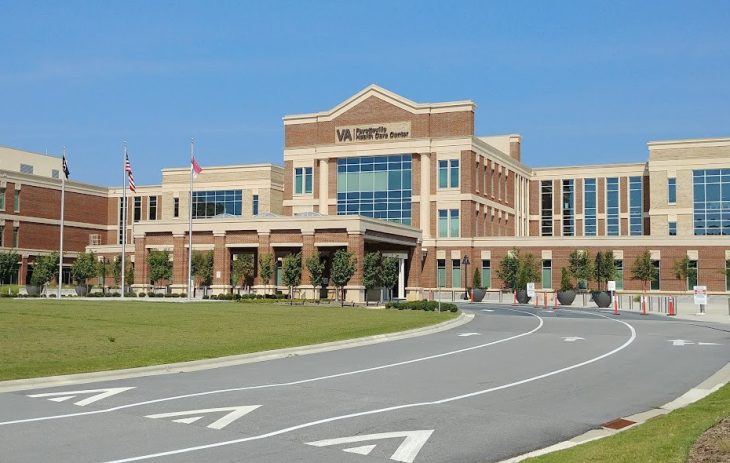About Fayetteville VA Medical Center
Veterans who are experiencing struggles with their physical, mental, or behavioral health can find supportive care at the Fayetteville VA Medical Center in Fayetteville, North Carolina. It’s conveniently almost next door to the North Carolina State Veterans Home.
Providing a continuum of services including residential care, outpatient support, and telehealth care, this facility offers veterans and their families a blend of evidence based therapies and holistic recovery services that will help transform their lives. Referrals are required to enroll.
Veterans face unique challenges once they leave a life of service and reintegrate back into civilian life. Many veterans will go on to struggle with their mental health or even turn to substance use to help manage negative thoughts and emotions. These are feelings that might have been brought on or exasperated during their time on duty.
To help veterans cope with these struggles, the VA Medical Center offers individualized, specialized, and targeted recovery care. The Fayetteville Mental Health Department addresses addiction use but can also help you overcome challenges if you have a dual diagnosis as well. The integrative team here will determine what therapy approaches will best serve you.
In some cases, medication assisted treatment (MAT) can help you combat cravings and minimize your risk of relapse. There’s a medical team here as well that can oversee any detoxification services you might need to start your addiction recovery plan. If you need exercise, they have a MOVE! program that can be adapted for off site activity.
Their commitment to reaching veterans from all walks of life is one aspect of this Medical Center that I appreciate most. For example, you’ll find compassionate care through their homeless veterans program. There is also dedicated support for veterans who are also members of the LGBTQ+ community.
Levels of Care
-
Inpatient
Inpatient and residential programs provide round-the-clock medical and emotional support as you live at the treatment facility. This level of care may be recommended if you have severe addictions or mental health conditions since it removes outside distractions and allows you to focus solely on therapy.
-
Outpatient
In outpatient therapy, you’ll attend therapy sessions several times each week while living at home. This is ideal if you have a strong support system and a lower risk of relapse. Outpatient treatment offers flexibility to maintain work, school or family obligations.
-
Aftercare
Aftercare programs provide ongoing support after you complete a rehab program. They may include several components to help you maintain sobriety including therapy, community support groups and relapse prevention strategies. This gives you a network of resources as you reintegrate into your daily life.
-
Dual Diagnosis
Dual diagnosis programs address substance use disorders and co-occurring mental health conditions simultaneously. This integrated approach to care improves the likelihood of long term recovery and stability by addressing the root causes of addiction.
-
Intervention
An intervention is a structured and professionally guided conversation with an individual who is struggling with addiction. During the conversation, family and friends will encourage you to seek treatment. This is often a pivotal step for those resistant to getting help.
Detox Service Setting
-
Inpatient Detox
Inpatient detox occurs in a dedicated treatment facility. You’ll live there around the clock and receive intensive medical support and supervision to help manage your withdrawal symptoms. It is suitable for individuals with moderate to severe addictions as it ensures a stable detox environment.
-
Outpatient Detox
Outpatient detox gives you access to medically supervised withdrawal services while still allowing you to live at home. You’ll attend a clinic for treatment and monitoring. This flexible option is suitable for those with mild to moderate withdrawal symptoms who have strong support systems.
Programs
-
Adult (18+)
Adult programs address the substance use and life challenges specific to adults. Therapists can deliver sessions in individual, group and family settings. Services often include job support and life skills training in a structured environment.
-
Alcohol Detox
Alcohol detox programs offer medical support to help individuals withdraw safely from alcohol. Your care team may use medications to ease your symptoms and provide medical monitoring to address complications.
-
Cognitive Behavioral Therapy
Cognitive behavioral therapy focuses on changing harmful thought patterns and behaviors associated with addiction. You’ll learn healthier coping mechanisms by identifying and replacing negative thoughts. This improves your emotional resilience and decreases your relapse potential.
-
Men
Men's programs address substance use while also considering the social pressures, family roles and mental health concerns that are specific to men. You’ll learn healthy coping mechanisms as you build emotional resilience and develop communication skills.
-
Military / Veterans
Military and veteran programs offer specialized support for clients who served in the armed services. Programs focus on reintegration and healing within a structured and supportive environment that acknowledges the unique struggles of military life.
-
Opioid Detox
Opioid detox uses medications to ease severe withdrawal symptoms. It also includes medical supervision to help you manage potential complications. These services allow you to stabilize and begin a recovery plan.
-
Rational Behavior Therapy
Rational behavior therapy helps you identify irrational beliefs that contribute to an addiction. Challenging and modifying those beliefs helps you develop healthier attitudes and behaviors. This therapy supports long term sobriety and sustainable recovery.
-
Seniors (65+)
Senior programs address the unique needs of older adults like chronic pain, grief and isolation. Programs include peer support and medical oversight for age related health concerns. The goal is to improve quality of life and promote sober aging.
-
Women
Women's programs offer a safe and supportive space to focus on gender specific issues such as trauma, family roles and mental health conditions. Therapists tailor the sessions to address women's needs and foster empowerment in a healing and nurturing environment.
Payment Options
- Military Insurance
- Private Insurance
- Self Pay
Accreditations
-
 SAMHSA
SAMHSA
-
 Joint Commission
Joint Commission
Amenities
- Metropolitan Area
Contact
2300 Ramsey Street
Fayetteville, NC 28301





